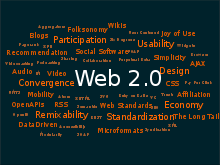An optimized writing by the developments of digital technologies
If the web writing takes up the methods of traditional journalism, it can't be limited to a simple transposition of contents from paper to the Internet. This in itself has little value. The development of digital technologies has released the writing of numerous limits (time, the restricted broadcasting space, the number of readers, etc.) and allowed a direct relationship with the reader...Turn the reader into an actor !
What characterizes web writing from journalistic writing is undoubtedly the place given to the netsurfer. Formerly simple reader, he is now with the Web 2.0 a full actor which can now generate content through comments made on articles, discussions on newsgroup, chats, blog. He can also "describe " the information received by taking it over and annotating it. Interaction is the heart of web writing! This is what will enable the content to exist, to go further and to spread on the Web.This interaction with the netsurfer can be impulsed and fed by the implementation of different actions :
Get sure that the message received is the message you want to spread

Tagcrowd and Wordle mark themselves out among tag generators.
Enable the netsurfer to deepen his reading
The use of hypertext links (directed outside) allows to link one's writings to other pages on the same subject. This gives an opportunity to deepen the subjects with an access to complementary resources and settles a new dialogue between authors and readers. Internet has dramatically changed our relationship with information : it is no longer isolated, it gets into a large field of knowledge ! Creating hypertext links also offers numerous opportunities :- contextualizate the subject giving it therefore more body,
- develop the reader's loyalty whom will appreciate the richness of the content,
- give your writing a supplementary visibility by inscribing it in a wider network (sites quoted with their link can quote you back with your own site's link),
- capture the netsurfer's interest by inciting him to trail around the page.
Arouse participation
Digital communication sets out less to produce a content than to share it with netsurfers who are encouraged to give their opinion, to build a relationship between readers and to relay it. It especially requires :- the implementation of comments appearing more and more as an extension of the article. Netsurfers will add new data, give another point of view or refer to other relevent contents on the same subject,
- the implementation of "share icons " underneath the article which will encourage the reader to relay,
- the launching of a discussion in a newsgroup,
- a call for Papers, etc.
These techniques allow moreover to improve the content according to readers feedbacks and to unite a community around these writings. Furthermore, a tool as Wiki gives the netsurfer an opportunity to add his own data to the existing ones and to modify the latter. Digital technologies marks the transition from individual writing to collaborative writing !
Go beyond the bondaries of time
Instant writing...
Internet allows to have not only a direct relationship with the reader but to have it instantaneously... It is possible today, thanks to social networks, to broadcast contents and to have answers, all that live ! Twitter, Facebook, Coverit Live... All these "live-blogging " tools encourage the implementation of new writing practices in which the content is designed as a support to a broader information rather than as an end in itself. The writing is now part of a more collaborative world where the author attends live the broadcasting of his production : it is relayed on blogs, tweeted, scooped, retweeted, commented... A true editorial chain is naturally set up to make this writing alive, so far as it is of quality. This can only modify deeply the relationship between the author and his writing, the former having to "let go " more about his production, accepting to be judged, sometimes harshly... This fact requires for who wants to publish online to have a former thinking on his relationship with writing but also with what he is ready to show of himself. The transition from written to oral can be difficult......analysis writing
In parallel with instant writing, digital technologies allow an analysis writing/reading. In fact, the appearance of digital tablets, smartphones and other mobile communication tools led to a different reading behavior, the netsurfer being able to select and keep the sources that interests him, and to go back to them later in a more comfortable environment. The issue for the web will be to adopt new editorial strategies which will push the reader to collect the content and to read it later, deepening his reading. Dedicated tools have emerged : for example Pocket (formerly Read It Later) or Evernote which allow to put besides selected contents from the web, to archive them and to classify them with filters or tags.Enhancing online information
Digital technologies allow to enhance articles with various contents and to mix formats for a richer route for the reader ! Loïc Haÿ, specialist in services and uses of information technologies reviews some widgets (= applications) which enable to enhance online information : creation and personalization of photo albums, integration of 3D models and of videos, etc. These video clips (in French) come from the Explorcamp organized by the Mitic (Mission for Information Technologies for Corsica) on the 26 and 27 of June 2008 and having for topic the Web 2.0.explorcamp - enrichir contenu by mitic20
explorcamp - enrichir contenu multimedia 2 by mitic20